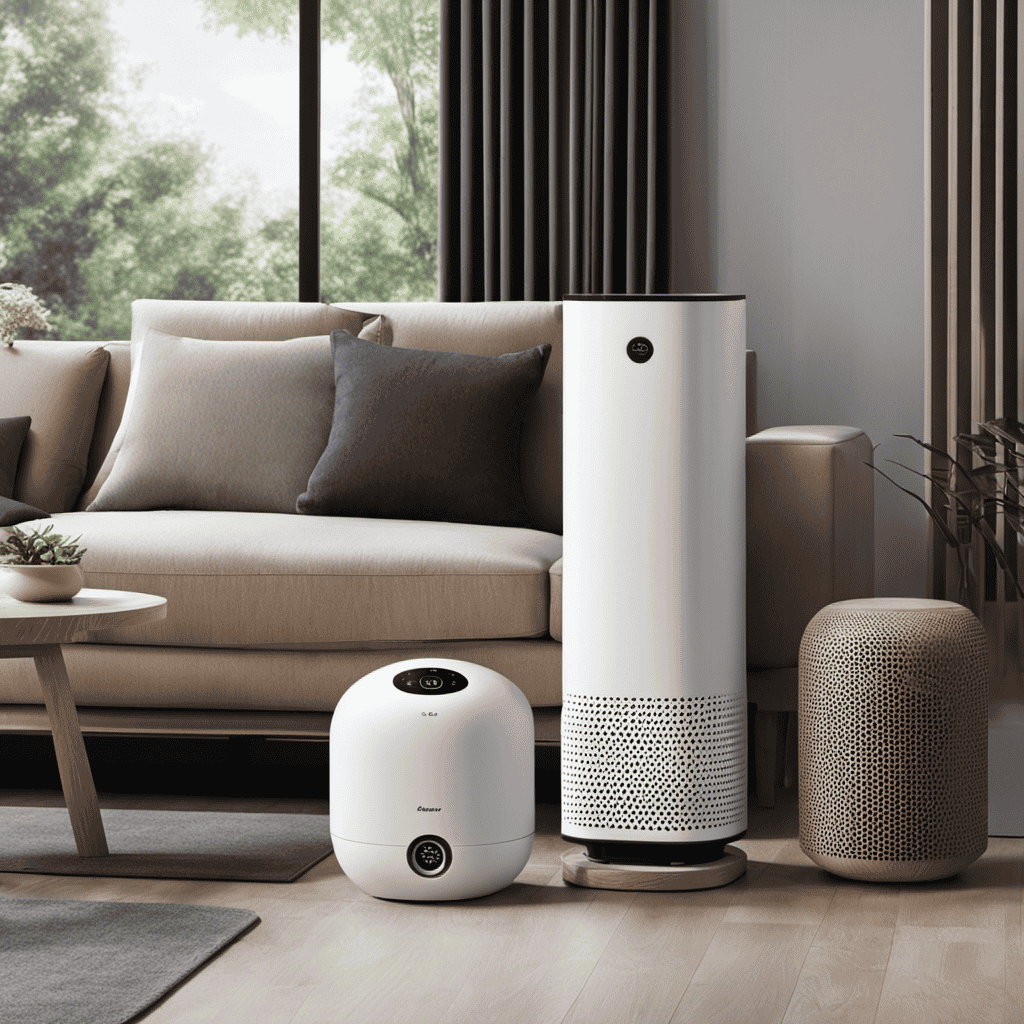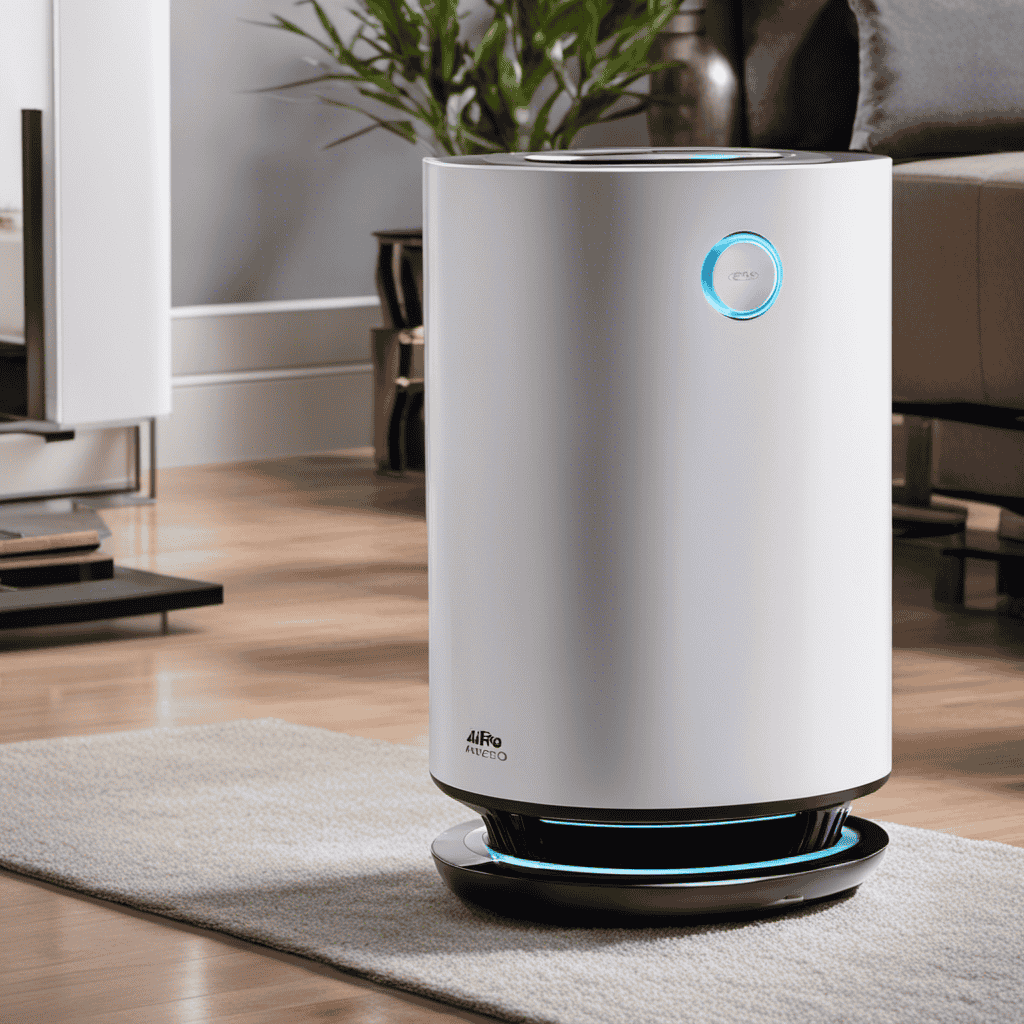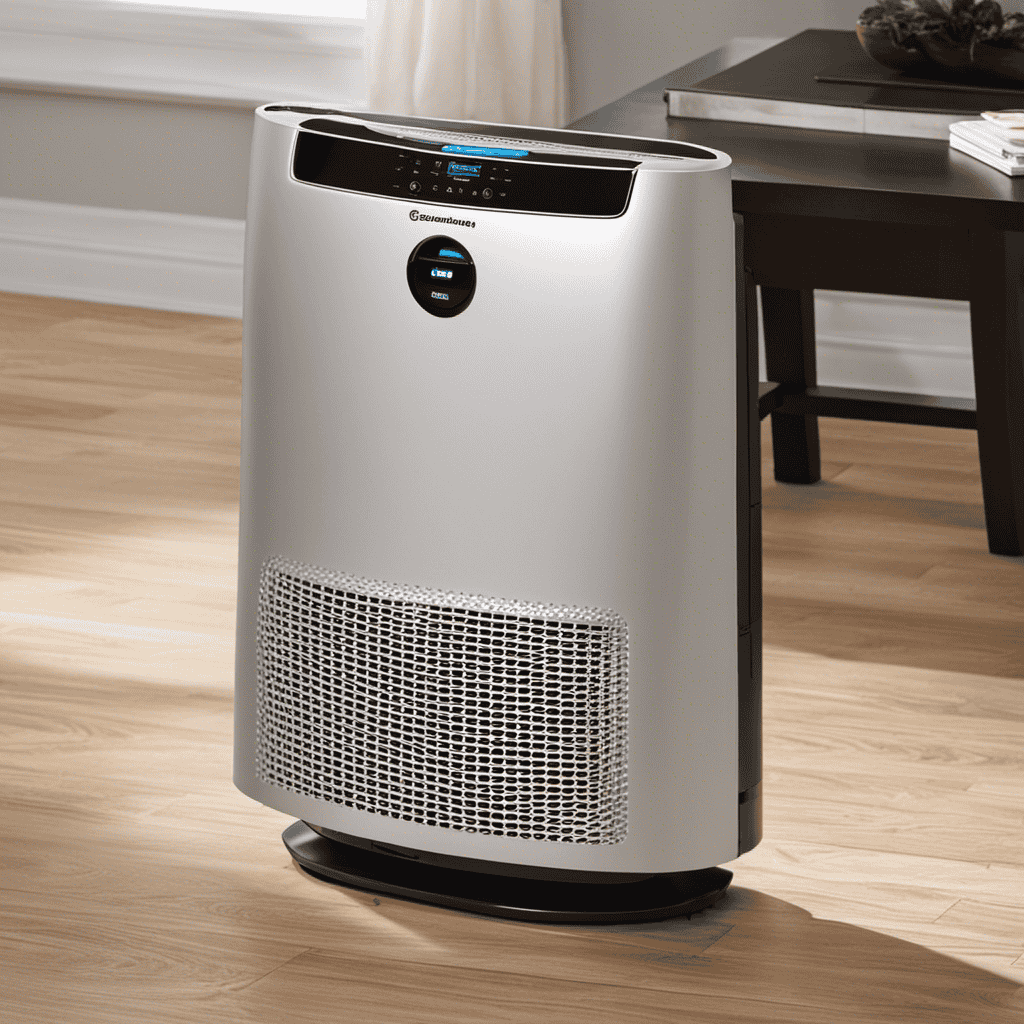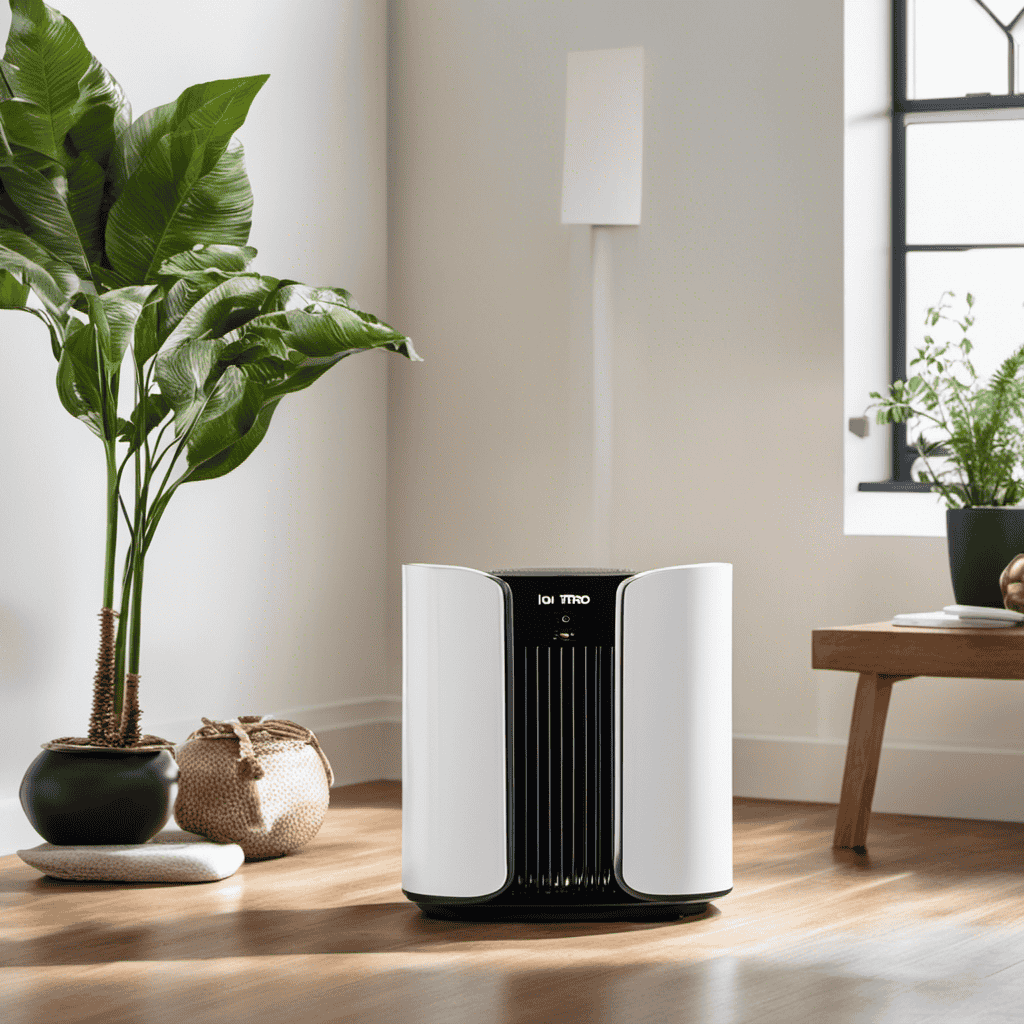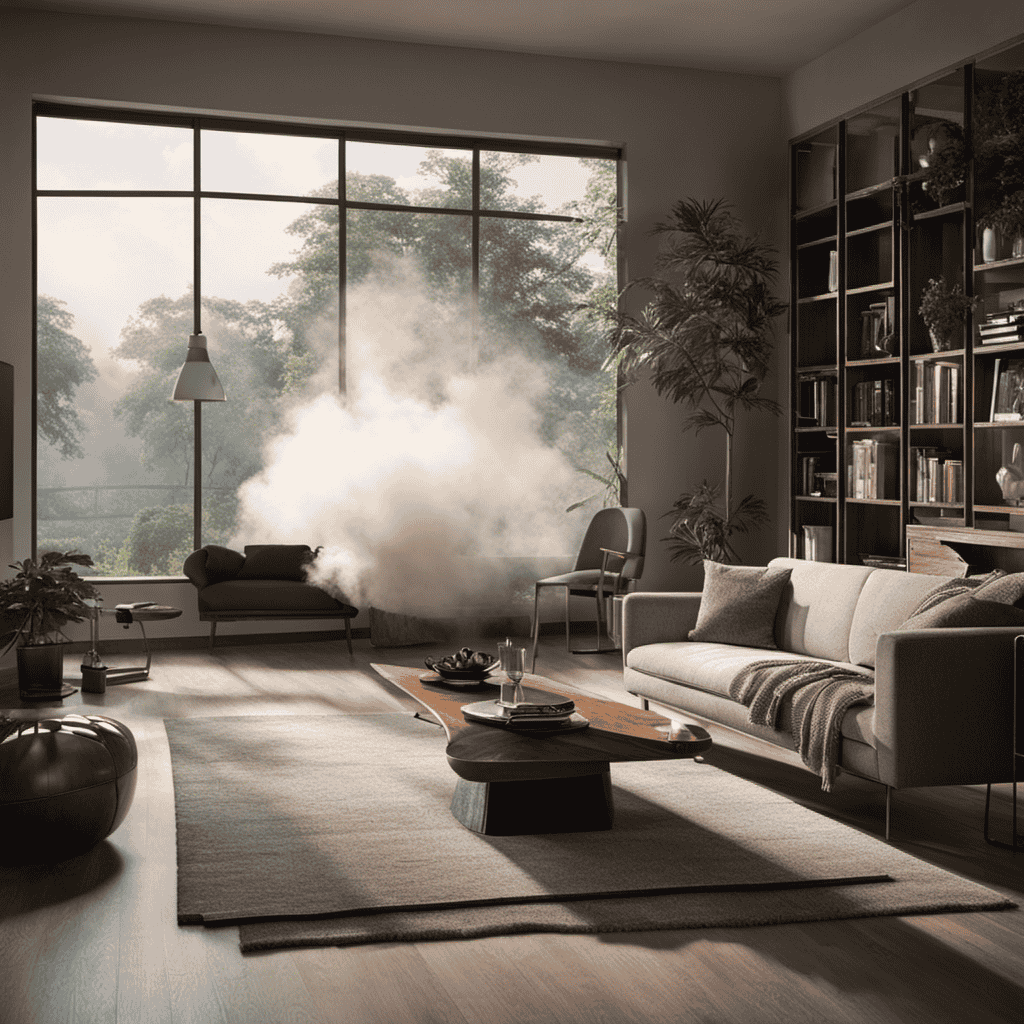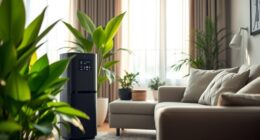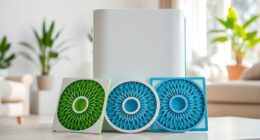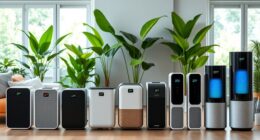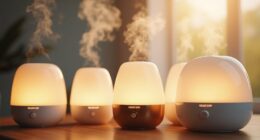You might be wondering, ‘Why would I consider Reddit’s suggestions on picking an air purifier?’
Well, let me tell you, as an avid Redditor myself, I’ve seen firsthand the power of collective knowledge and experience.
In this article, I’ll guide you through the essential factors to consider when selecting an air purifier, based on the insights shared by the Reddit community.
So, let’s dive in and discover what to look for in an air purifier according to the trusted voices of Reddit.
Key Takeaways
- User reviews provide valuable insights into the efficiency and effectiveness of air purifiers, particularly in terms of removing pollutants like dust, pet dander, pollen, and smoke particles.
- HEPA filters are considered the best filtration technology as they capture 99.97% of airborne particles as small as 0.3 microns, making brands like Dyson, Honeywell, and Coway a good choice.
- Investing in a high-quality air purifier with a HEPA filter may come with a higher price tag, but it offers long-term benefits such as reducing respiratory issues and allergies.
- Consider the size of the room and the air purifier’s coverage area to ensure optimal performance and proper filtration. Additionally, pay attention to the noise level, operating modes, and additional features that enhance convenience and ease of use.
Efficiency of the Air Purifier
You’ll want to make sure the air purifier is efficient in removing pollutants and allergens from the air.
When researching air purifier brands, it is important to take into account user reviews to gauge their effectiveness. User reviews can provide valuable insights into the performance and efficiency of different air purifiers.
Look for reviews that specifically mention the ability of the purifier to remove common pollutants such as dust, pet dander, pollen, and smoke particles. Additionally, pay attention to reviews that mention improvements in air quality and reduction in allergy symptoms after using the purifier.
These reviews can give you a good indication of how well the air purifier works and whether it is worth investing in for cleaner and healthier air in your home.
Types of Air Filtration Technology
When it comes to choosing the best filtration technology for an air purifier, the key consideration is finding a balance between cost and effectiveness.
There are several types of filtration technologies available, each with its own advantages and disadvantages.
Best Filtration Technology
If you’re looking for the best filtration technology in an air purifier, consider models that utilize HEPA filters. HEPA stands for High Efficiency Particulate Air, and these filters are known for their ability to capture 99.97% of airborne particles as small as 0.3 microns.
Many of the best air purifier brands, such as Dyson, Honeywell, and Coway, use HEPA filters in their models. These filters are highly effective in removing common indoor pollutants like dust, pollen, pet dander, and mold spores. They are also recommended for individuals with allergies or asthma.
When reading air purifier reviews, look for mentions of HEPA filters and their performance in removing airborne contaminants. Investing in an air purifier with HEPA filtration can significantly improve the air quality in your home.
Cost Vs. Effectiveness?
HEPA filters are highly effective in removing common indoor pollutants. However, it’s important to consider the cost versus effectiveness when choosing an air purifier. While HEPA filters are known for their superior filtration capabilities, they can come with a higher price tag.
However, it’s important to weigh this cost against the long-term benefits they provide. HEPA filters have been proven to capture up to 99.97% of particles as small as 0.3 microns, including allergens, dust, and pet dander. This can greatly improve indoor air quality, reducing the risk of respiratory issues and allergies.
Additionally, investing in a high-quality air purifier with a HEPA filter can lead to long-term cost savings by reducing the need for medication, doctor visits, and even HVAC maintenance. So, while the initial cost may be higher, the effectiveness and long-term benefits make HEPA filters a worthwhile investment.
Coverage Area and Room Size
When it comes to choosing an air purifier, the size of the room is an important factor to consider. A larger room will require a higher airflow rate and a larger coverage area in order to effectively purify the air.
It’s also important to note that the size of the air purifier itself doesn’t necessarily determine its effectiveness; it’s the combination of the purifier’s features and specifications that ultimately determine its ability to clean the air.
Room Size Importance
The size of your room really does matter when choosing an air purifier. It’s important to consider the room size compatibility of the air purifier to ensure optimal performance and effectiveness.
Here are a few reasons why room size is important when selecting an air purifier:
-
Proper filtration: An air purifier that is too small for your room may not be able to effectively filter the air, leading to poor air quality and potential health risks.
-
Noise level: A larger air purifier may generate more noise, which can be a concern if you have limited space or if you plan to use it in a bedroom or office.
-
Space limitations: If you have limited space, it’s essential to choose an air purifier that fits well in your room without obstructing movement or causing inconvenience.
Considering these factors will ensure that you choose an air purifier that is compatible with your room size and meets your space limitations.
Coverage Area Considerations
To ensure the air purifier effectively covers the area you need, consider the square footage of the room. The size of the room directly impacts the air purifier’s ability to clean the air efficiently. When selecting an air purifier, it is essential to understand the coverage area it can handle. To help you make an informed decision, I have prepared a table showcasing different room sizes and the corresponding recommended air purifier coverage area:
| Room Size | Square Footage | Recommended Coverage Area |
|---|---|---|
| Small | Up to 300 sq. ft. | 150 sq. ft. |
| Medium | 300-700 sq. ft. | 350 sq. ft. |
| Large | 700-1,500 sq. ft. | 550 sq. ft. |
Considering the room layout and air quality standards, it’s crucial to choose an air purifier that can effectively clean the entire room’s air. This table can serve as a helpful guide when determining the appropriate coverage area for your specific room size.
Size Vs Effectiveness
Considering the layout and air quality standards in your room, it’s important to choose an air purifier that can effectively clean the entire room’s air. When it comes to air purifiers, size and effectiveness go hand in hand. Here are three key factors to consider:
-
Compact Design: Look for air purifiers that are compact and portable, making it easy to move around and place in different areas of your room.
-
High CADR Rating: CADR stands for Clean Air Delivery Rate, which measures how efficiently an air purifier can remove pollutants from the air. Look for air purifiers with high CADR ratings for maximum effectiveness.
-
Multiple Filtration Stages: Opt for air purifiers with multiple filtration stages, such as a pre-filter, HEPA filter, and activated carbon filter. These filters work together to capture different types of pollutants, ensuring cleaner and healthier air.
When researching air purifier brands and reading air purifier reviews, keep these factors in mind to make an informed decision and choose an air purifier that effectively cleans the air in your room.
Noise Level and Operating Modes
When choosing an air purifier, it’s important to check the noise level and available operating modes.
The noise level of an air purifier can vary greatly depending on the design and quality of the unit. It is essential to find a balance between a quiet air purifier and one that effectively removes pollutants from the air. Reading customer reviews can provide valuable insights into the noise level of different models.
Additionally, it is crucial to consider the available operating modes of an air purifier. Some units offer multiple speed settings and timer functions, allowing you to customize the purification process based on your needs. These features can enhance the efficiency and convenience of using an air purifier.
Energy Consumption and Certification
The energy consumption of an air purifier can vary depending on the model and its certification. When choosing an air purifier, it’s important to consider its energy efficiency to ensure it doesn’t consume excessive electricity.
Here are some key points to keep in mind:
-
Energy Efficiency: Look for air purifiers with high energy efficiency ratings. These models are designed to consume less power while still effectively purifying the air in your home.
-
Certification Process: Check if the air purifier has been certified by reputable organizations such as ENERGY STAR. This certification ensures that the device meets strict energy efficiency guidelines.
-
Energy Saving Features: Some air purifiers come with energy-saving features like auto-off timers and sleep modes. These features help reduce energy consumption when the purifier is not in use or during low activity periods.
Considering the energy consumption and certification of an air purifier can help you make an informed decision and save on your energy bills while maintaining clean air in your home.
Additional Features and Maintenance Requirements
One important factor to keep in mind when choosing an air purifier is its additional features and maintenance requirements. These aspects can greatly affect the overall efficiency and longevity of the unit. To help you make an informed decision, I have gathered some maintenance tips and user reviews to assist you in finding the right air purifier for your needs.
| Feature | Description | User Reviews |
|---|---|---|
| Timer | Allows you to set the purifier to run for a specific time period, saving energy and ensuring filtered air when needed. | "I love the timer function! It’s so convenient to have the purifier turn on automatically before I get home." – Sarah |
| Filter Replacement Indicator | Alerts you when it’s time to replace the filters, ensuring optimal performance and clean air at all times. | "The filter replacement indicator is a lifesaver. I no longer have to guess when to change the filters." – Mark |
| Wi-Fi Connectivity | Allows you to control the air purifier remotely using a smartphone app, providing convenience and ease of use. | "Being able to control the purifier from my phone is amazing. I can turn it on/off without leaving my bed!" – Emily |
These additional features can enhance your air purifier experience and make maintenance easier. Remember to consider user reviews to get insights into the actual performance and reliability of the product. By choosing an air purifier with the right features and maintenance requirements, you can ensure clean and fresh air in your home.
Frequently Asked Questions
Can an Air Purifier Completely Eliminate All Allergens and Pollutants From the Air?
No, an air purifier cannot completely eliminate all allergens and pollutants from the air. While they can be effective in reducing levels, it’s important to understand their limitations and consider other strategies for improving indoor air quality.
How Often Do I Need to Replace the Filters in an Air Purifier?
When it comes to replacing air purifier filters, it varies based on usage and the type of filter. Generally, it’s recommended to replace them every 6-12 months. Regular filter replacement ensures optimal performance and cleaner air.
Can an Air Purifier Remove Unpleasant Odors From the Air?
Yes, an air purifier can remove unpleasant odors from the air. Regular maintenance, such as replacing filters, is important for optimal performance. Using an air purifier has many benefits, including improving indoor air quality.
Is It Safe to Use an Air Purifier Continuously, Even While Sleeping?
It’s safe to use an air purifier in a baby’s room. They can help remove allergens and pollutants, improving air quality. However, it’s important to choose a purifier with low noise levels and consider any potential negative side effects on health.
Are There Any Specific Brands or Models of Air Purifiers That Are Highly Recommended by Reddit Users?
According to Reddit users, the top-rated air purifier brands are highly recommended for their effectiveness. Additionally, they suggest the best air purifier models for allergy relief. It’s important to consider these recommendations when searching for an air purifier.
Conclusion
In conclusion, when searching for the perfect air purifier, it’s crucial to consider various factors. These factors include efficiency, filtration technology, coverage area, noise level, energy consumption, and additional features.
Remember, choosing the right air purifier is like selecting a guardian angel for your indoor air quality. So, don’t settle for anything less than the best.
With careful research and consideration, you can find the air purifier that will provide clean and fresh air for you and your loved ones.
